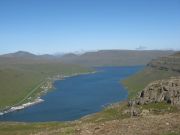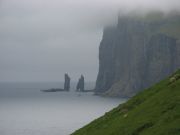You would miss seeing some great places [covered in the next report] but if either time or money curtails you, you could have a smashing time based on just this and the first reports.
|
 |
 |
 |
 |
 |
 |
 |
 |
Kollefjordur from the mountain road
 |
 |
The Færoes were associated with Norway and remained so even after the more southerly Shetlands and Orkneys were firmly established as part of Scotland. When Norway fell under Denmark, the Færoes did as well. During the Napoleonic wars, Great Britain occupied Denmark to keep out the French. Denmark entered the war on napoleon’s side and their Nordic rival, Sweden, then joined the anti-French coalition. Losers do lose and Denmark had to cede Norway to Sweden. The Færoes were left behind with Denmark, as were Greenland and Iceland.
In the second world war the UK occupied the Færoes the day after the Germans invaded Denmark and held them until the end of the war. They were then returned to Denmark but by this time there was a major movement for independence. After one election they declared independence but the Danish king dissolved the Færoes Parliament and the new one revoked the declaration. So the Færoes remain subject to Denmark but they enjoy a high degree of self-government, they are an associate member of the Nordic Council, with their own representatives and they are seeking full membership. With Greenland and Iceland they form the West Nordic Council and they have a very wide-ranging free trade agreement with Iceland. Unlike Denmark, the Færoes are not part of the EU; entry would be pretty dodgy for a fish dependent economy.
|
|
| Favourite spots: |
|
Pam chose Saksun as her favourite place in all the Færoes, a major accolade but far from unreasonable. Eire uses the word ‘serene’ about it in her comment on my photo [http://www.globosap-iens.net/dav idx/picture-saksun-56786.html]. Where words such as ‘magnificent,’ ‘picturesque’ and ‘outstanding’ can be used about almost anywhere in the islands, Saksun earns the use of ‘serene’ more than anywhere else we went. The setting is sufficient in itself, a cluster of turf-roofed house on one side of the road and a church as seen in the photo above what is almost a lagoon formed by the sea with a narrow outlet between steep cliffs to the open Atlantic. However it has a splendid addition in the form of Duvugardur, an old farm now converted into a museum. We went for a walk but to reach the open ocean was more than the time allowed. However the visit to the museum and the walk down to the side of the lagoon made for a splendid visit.
|
|
| What's really great: |
|
We didn’t get the best of Tjornovik; it was one of the few occasions during our visit when it was really cold in the day time and we were most disappointed to find the cafe closed. It is the most northerly village on Streymoy, delightfully situated in a bay at the bottom of a hill – with the normal allocation of small alleys and turf roofs. As with most of the villages, the hay crop was being gathered and put to dry on purpose built structures resembling fences between fields. [Continued below]
|
|
| Sights: |
From Gamlanett, near Kirkjubøur, ferries go to Hesdur and to Sandoy. We took a ferry to Sandoy with views of Hesdur and Koltur and Vágar. Sandoy is not as excitingly shaped as some of the other islands, is less mountainous and more agricultural – but I found it not a jot less attractive. Judith took the car and so we were able to get round quite a bit, though not to see everywhere. As you go into Skopun on the ferry, you can see a very small island to the west of Sandoy. This is Djúpaberg and belongs to the farmers of Kirkjubøur, who use it for grazing.
Crossing the island to the southern village of Sandur, we had superb views of the most southerly islands, Skuvoy, beautifully structured Stora Dimun and Litla Dimun with one farm between them and, in the distance the larger island of Suduroy. An unclassified road took us to the uninhabited but delightful bay of Søltuvik, where we had a walk and were mobbed by arctic terns. On the way back we lunched near puffin cliffs.
|
|
| Accommodations: |
 |
 |
 |
 |
 |
 |
 |
 |
Risin and Kellenin from near Tjornuvik
 |
 |
[Tjornuvik continued]
From the road shortly before Tjornuvik, there is a view, spectacular even by Færoes standards, of the north of Eysturoy. The village of Eiði could be seen and still further north the great sea stacks of Resin and Kellingin. They were a giant and a witch [what else?] sent from the Iceland giants to get the Færoes. Having made a pig’s ear of the job, they were caught by the dawn and, as you probably know, that meant they were turned into sea stacks. On the road to Tjornovik, the village of Haldarsvik has a fascinating octagonal church and I first noticed the prominence of sculpted doves on tombs.
|
|
| Nightlife: |
Beyond the tunnel for Vágar lies the village of Kvivik. The archaeological site of a Viking settlement is very interesting as is a memorial in the churchyard to the whole crew of a boat that went down. The first five all shared a surname and came from this small village. It is hard to imagine the effect that this type of disaster, probably far from rare, had on the social life of a village community.
Vestmanna is one of the best publicised places on the Færoes because there are two firms offering boat trips to the nearby bird cliffs. I regard it as a privilege to have been on one of these trips. The cliffs without the birds would have been spectacular; they rise vertically about two thousand feet and the boat goes around stacks, through arches and into caves. Without the spectacular cliffs, the birds alone would have been a treat; all the auks, gannets, fulmars, terns galore, kittiwakes, arctic and great skuas. The combination of scenery and birds was truly sensational.
|
|
| Hangouts: |
|
The Færoes language is derived from old Norse. A Norwegian on a boat trip told me that Icelanders and Færoese can generally understand each other to the extent necessary for a conversation but that the language was far less closely liked to other Scandinavian ones. Just accept that for me it might as well have been Mandarin. One rule that usually works is never to assume that the spelling of a place gives any indication of how to say it. For example, Vagar is pronounced something like Vau-er [au as in fraud.] The letter eth is used a lot [Ð, ð being upper and lower case respectively] but it never seems to be sounded. For example Viðareiði is sounded with no consonant except V and r. Gjogv, so I am told, is pronounced something like Djeggv.
|
|
| Restaurants: |
Nolsoy is one of the smaller populated islands of the Færoes and shares the name with its principal village. After Mykines it is said to be one of the best places to see puffins close up but that involves a fairly lengthy and arduous trek. It can be seen clearly from most of Torshavn and can be said to beckon. I must admit to a degree of disappointment. What appears as a quaint village right up to arrival, seems from within run down in comparison with most others we saw.
Nolsoy is world class for its colony of storm petrels but that means staying on the island as the birds are at sea until late. There is a major walk [said to be 7 hours return] from Nolsoy village to the lighthouse at the far end of the island.
Those with a shorter time to spare on the island would be well advised to turn left and make for the viewpoint shown on local information boards, which is at the lower [left on arrival] end of the island.
|
|
| Other recommendations: |
|
I was persuaded, rightly I think although it was hard to accept, that I should not go to Mykines, the westernmost of the islands only reachable by a small boat ferry. As Judith’s brother, an excellent photographer with great equipment, said, after going twice in four days, it’s not everywhere that you need a macro setting for wild birds! [including puffins] BUT, it does look STEEP.
|
|
Published on Wednesday July 30th, 2008
|
|
 Publish on Facebook
Publish on Facebook
|
Tue, Aug 05 2008 - 08:38 PM
 by mtlorensen
| Interesting history. I especially liked the photo of Risin and Kellenin. |
Sun, Aug 03 2008 - 05:00 AM
 by krisek by krisek
| Splendid one! No cafe on cold weather must have been awful. Great read and practical! Many thanks. |
Fri, Aug 01 2008 - 04:21 AM
 by jorgesanchez by jorgesanchez
| David, great viajero! Thanks for showing us the beauties of Feroe |
Thu, Jul 31 2008 - 08:06 AM
 by horourke by horourke
| This great statement of the social impact of shipwrecks, the wealth of sea-bird life and the intricate nuances of the local language is a rich source of future searches. |
Wed, Jul 30 2008 - 02:57 PM
 by eirekay by eirekay
| Your fondness for these islands comes through so beautifully! These area wonderful read as well as being informative! |
| Information: |
| Login if you are a member, or sign up for a free membership to rate this report and to earn globo points! |
|

|
